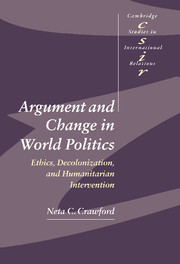Book contents
- Frontmatter
- Contents
- List of illustrations
- List of tables
- Acknowledgments
- Introduction
- 1 Argument, belief, and culture
- 2 Ethical argument and argument analysis
- 3 Colonial arguments
- 4 Decolonizing bodies: ending slavery and denormalizing forced labor
- 5 Faces of humanitarianism, rivers of blood
- 6 Sacred trust
- 7 Self-determination
- 8 Alternative explanations, counterfactuals, and causation
- 9 Poiesis and praxis: toward ethical world politics
- Appendix. African decolonization
- Select Bibliography
- Index
- CAMBRIDGE STUDIES IN INTERNATIONAL RELATIONS
9 - Poiesis and praxis: toward ethical world politics
Published online by Cambridge University Press: 22 September 2009
- Frontmatter
- Contents
- List of illustrations
- List of tables
- Acknowledgments
- Introduction
- 1 Argument, belief, and culture
- 2 Ethical argument and argument analysis
- 3 Colonial arguments
- 4 Decolonizing bodies: ending slavery and denormalizing forced labor
- 5 Faces of humanitarianism, rivers of blood
- 6 Sacred trust
- 7 Self-determination
- 8 Alternative explanations, counterfactuals, and causation
- 9 Poiesis and praxis: toward ethical world politics
- Appendix. African decolonization
- Select Bibliography
- Index
- CAMBRIDGE STUDIES IN INTERNATIONAL RELATIONS
Summary
Violence is for the morally infallible. If you are convinced that you alone have truth, there is little recourse but to threaten, intimidate, bribe or coerce those who disagree with you if they do not come around to your view – or ultimately if these methods are unavailing, to use force. That, more or less, is what we see on the international scene today.
While the last decade of the twentieth century was characterized by the reconfiguration of world politics with the end of the Cold War, it was also marked by arguments about humanitarian interventions (e.g. Haiti, Somalia, Kosovo) and the failure to intervene (Rwanda). In some cases, most dramatically in Rwanda where a genocide occurred before the eyes of the world in 1994, the failure to undertake humanitarian intervention prompted, for some, remorse and a desire to act more quickly. Remorse was heightened when General Romeo Delaire of Canada, who commanded the UN force in Kigali prior to the 1994 genocide in Rwanda, said that a force of 5,000 trained soldiers could have prevented much of the killing. On the other hand, some fear that easing the legal and political path to humanitarian interventions will lead to more interventions undertaken for self-interested or strategic reasons. The legitimacy and conduct of humanitarian intervention – the threat or use of military force to protect or promote human rights – is thus likely to remain one of the central problems of world politics.
- Type
- Chapter
- Information
- Argument and Change in World PoliticsEthics, Decolonization, and Humanitarian Intervention, pp. 399 - 435Publisher: Cambridge University PressPrint publication year: 2002

